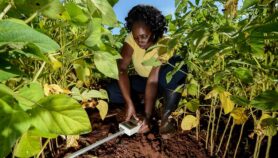By: Imogen Mathers
Send to a friend
The details you provide on this page will not be used to send unsolicited email, and will not be sold to a 3rd party. See privacy policy.
[LONDON] Concrete solutions must be drawn up to overcome the challenge of funding public-interest and investigative science journalism, amid the crisis in traditional print media and a decline in the number of specialist science reporters, a meeting in London heard this week (23 April).
The meeting discussed key focus areas for the 8th World Conference of Science Journalists (WCSJ), taking place in Helsinki, Finland later this year (24–28 June).
There was strong consensus that creating plans to safeguard investigative journalism — often the first activity to be sacrificed as journalism’s coffers dry up — in both developed and emerging economies should be a key priority in Helsinki.
SPEED READ
- Experts call for urgent need to back investigative science reporting
- ‘Maverick’ journalists could provide key to holding scientists to account
- The challenge is using new media without compromising traditional journalistic values
BBC science correspondent Pallab Ghosh said the WCSJ conference should focus on the crisis in science journalism, which is particularly a problem for developed nations at present.
"I think we are all aware that it’s something that affects Western nations more than emerging nations, where there are all sorts of new jobs in covering science and technology," he said.
But there was a debate over the accuracy of the claims that all is well with science journalism in developing countries, with some experts arguing that finding solid solutions for the sector in these regions was also necessary.
Connie St Louis, president of the Association of British Science Writers, said: "We have to find a way of funding science journalism, so that more science journalists can make a living and we can do more investigative journalism".
Like Ghosh, she flagged up the growing funding discrepancy between career opportunities offered in science communication and science journalism.
"We have this flow of jobs for science communicators, but very few jobs for science journalists," St Louis said. "We have more and more science communication bodies opening … but that is not the same as having journalism."
Ghosh agreed that simply publicising scientific findings is very different to rigorous, in-depth journalism.
"Our job isn’t to be the cheerleaders for science — it’s not to translate," he said. "As science becomes more important to society and policymaking, we’ve got a crucial role in asking the awkward questions."
St Louis added that journalistic "mavericks" are invaluable for their role in exposing science stories and holding scientists and policymakers to account.
"We need more mavericks, because I think some of the most exciting science journalists in the world at the moment are mavericks," she said. "They go and do their own thing and this produces some very fine journalism."
Ghosh argued that one real risk from funding cuts and other challenges is that science journalists might lose their "values". Maintaining the "kickass journalism" of the past is crucial, he said.
And this should involve embracing new ways of funding and delivering journalism.
"The traditional ways are failing, so it’s about exploring new media, exploring new ideas," he said.
"But most of all [it’s about] how best to maintain our values because, more than anything, we’ve got to argue that this [journalistic] filtering, this process, is not just about annoying the scientific community — as we should do; it’s also for society’s good that we ask the awkward questions."
Link to SciDev.Net‘s practical guide on investigative science journalism













